NCERT Solutions for Class 5 EVS Chapter 1 - Super Senses
Think and Tell
Q1: How did the ant know that the other ants were not from its group?
Ans: All animals have different senses. The ant had antennae to sense smell. With the help of the smell, it came to know that the other ants were not from its group. Each ant group has its own unique smell that helps them tell who is a part of their team.
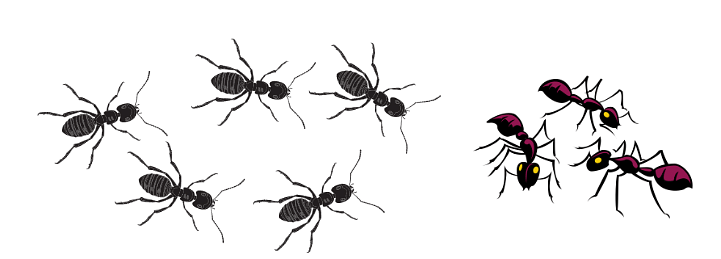
Q2: How did the guard ant recognise this ant?
Ans: By using it's smelling sense, the guard ant could recognise this ant.
Try This and Write
Drop some sugar, jaggery or anything sweet on the ground. Wait until the ants come there.
Q1: How long did it take for the ants to come?
Ans: It took about 15-20 minutes for ants to come.
Q2: Did one ant come first or a group of ants came together?
Ans: One ant came first, followed by a group of ants.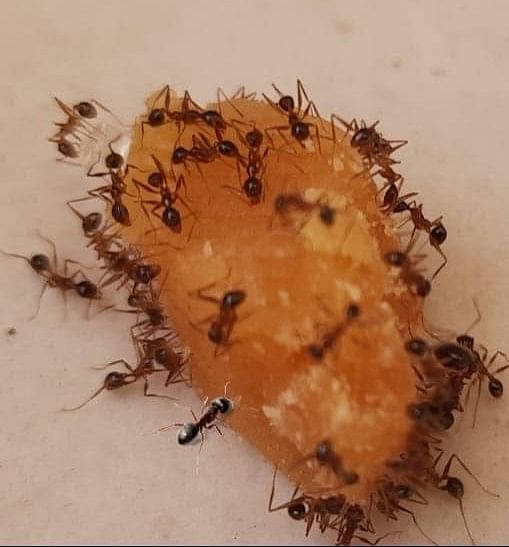
Q3: What did the ants do with the food?
Ans: The ants carried the food to their hole.
Q4: Where do ants go from there?
Ans: They went to their hole from there.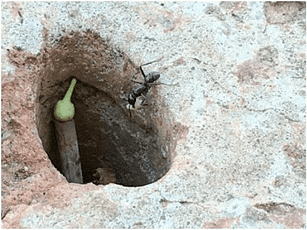
Q5: Do ants move in a line?
Ans: Yes, one ant follows the other and hence goes in a line.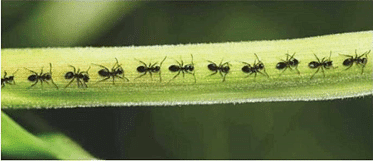
Now carefully, without harming the ants, block their path for a while with a pencil.
Q6: Now, observe, how do the ants move?
Ans: Even after blocking their path, ants climb up on the pencil. They still move in a line.

Q7: Now can you guess why the ants behaved like that when you blocked their path?
Ans: As the ants moves, they leave a smell on the ground. The other ants follow this smell to find the way. Thus, when their path was blocked, ants tried to maintain their path by following the smell.
Q8: Have you ever been troubled by mosquitoes? Just think, how do they know where you are.
Ans: Mosquitoes can recognise the smell of our body. They can also recognise us by the heat from our body.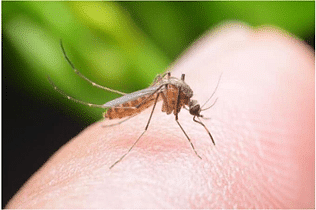
Q9: Have you seen a dog sniffing here and there? What do you think it is trying to smell?
Ans: Yes, I have seen a dog sniffing here and there. A dog can make out the presence of another dog in the area by smelling its urine or feces. The dog usually uses its smelling sense to find out if a new dog has come into the area. Dog sniffing the area
Dog sniffing the area
Write
Q1: In what ways do human beings make use of this special sense of smell of dogs?
Ans: This special sense of smell of dogs is used by humans in many ways.
Some examples are as follows:
(a) For catching criminals.
(b) For detecting stolen goods.
(c) For detecting bombs.
Q2: When do you find your sense of smell helpful to you? List some examples. Like — to know by its smell that food has gone bad or that something is burning.
Ans: Our sense of smell can help us to avoid accidents in many ways. These include:
(i) Finding the leakage of cooking gas from cylinders.
(ii) Burning of wires or clothes.
(iii) Nose can detect the delicious of food by its sense of smell.

Q3: Name the animals that you would be able to recognize only by their smell, without seeing them?
Ans: We can recognize pet animals like dog, cat, cow, buffalo, goat etc. by their smell.
Q4: Write the names of five things whose smell you like and five things whose smell you do not like.
Ans:
| I like the smell of | I do not like the smell of |
| Food | Garbage |
| Perfume | Dead fish |
| Flowers | Cow dung |
| Incense stick | Smell from urinal |
| Fresh air | Stale air |
Q5: Do you and your friends have similar answers?
Ans: Yes, our answers are similar to each other.
Discuss
Q1: Do the clothes of any of your family members smell? Whose?
Ans: Yes, sweat on my father’s clothes smell because he comes from outside.
Q2: Did you ever come across any smell in a crowded place such as a fair, bus, train, etc.
Ans: Yes
- At a fair, I smelled the delicious aroma of popcorn, cotton candy, or hotdogs being cooked. I also catch the scent of animals as there were petting zoos or horse rides nearby.
- When on a bus or train, I noticed different smells as well. There are smells of different perfumes or colognes that people are wearing. Sometimes, I encountered the smell of food that someone is eating on the bus or train.
It's important to remember that not all smells in crowded places are pleasant. Sometimes, you might come across unpleasant smells like garbage or body odor.
Think and Discuss
Q1: Sushila covered her nose when she cleaned Deepak’s nappy, but not when she cleaned her daughter's. Why do you think she did this?
Ans: When we feel something is dirty, we find its smell bad. In case of Sushila, she thought Deepak’s nappy had a dirty smell. So, she had to cover her nose. When she was cleaning her daughter’s nappy she did not think of it having a dirty smell.
Q2: How do you feel when you walk near a heap of garbage? Think of the children who spend the whole day picking garbage things from such garbage?
Ans: I feel like closing my nose when I walk near a heap of garbage. Children who spend the whole day picking things from such garbage might get used to the smell. Hence, they do not get offended by the smell.
Q3: Is a smell ‘good’ or ‘bad’ for everyone in the same way? Or does it depend on how each one feels about it?
Ans: It depends on how the person thinks about a particular smell. But some smells can always be bad for most of the people.
Let’s See
Q1: Write the name of a bird which has eyes in from of its head. (like in humans).
Ans: The bird which has eyes in front of it's head is an Owl.
Q2: Write the names of some birds which have eyes on either side of the head. What is the size of their eyes as compared to the size of their head?
Ans: Following birds have eyes on either side of the head:
Pigeons, crows, sparrows, eagles, etc. Their eyes are very small as compared to the size of their head.
Looking with One or Both Eyes
Q1: Could you see your friend’s action with one eye open, without moving your neck?
Ans: No, I could not see my friend’s action with one eye open, without moving my neck.
Q2: Now try to look at your friend’s action with both your eyes open but without moving your neck?
Ans: I could see my friend’s action now.
Q3: What is the difference on looking with one or both eyes?
Ans: I can see a wider area with both eyes as compared to with one eye. I can see better with my both eyes open.
Q4: Now toss a small ball or a coin and try to catch it. Try this with both your eyes open. Then close one eye and try to catch it. When was it easier to catch?
Ans: It was easier to catch the ball with both eyes open.
Q5: Imagine how it would be to have your eyes in place of your ears. What would you be able to do then, which you cannot do now?
Ans: If there were eyes on the sides of my head, I could see on my left and right without moving my neck.
Q6: Now can you guess from what distance can an eagle in the sky see a roti on the ground?
Ans: An eagle can see a roti on the ground from a distance of one and a half km to 2 km.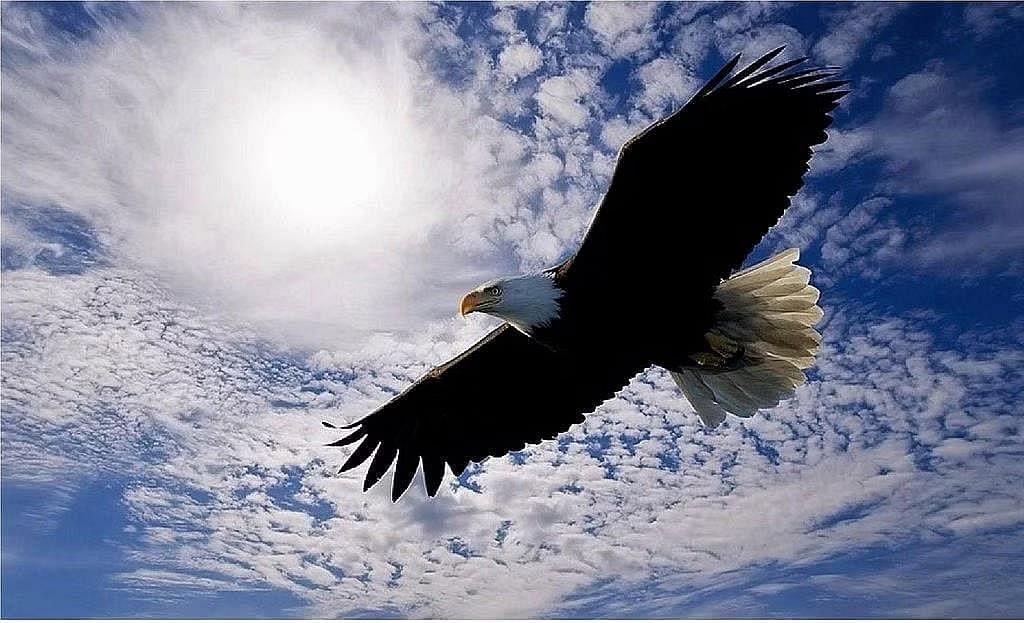
Write
Q1: The names of ten animals whose ears can be seen.
Ans: Dog, cow, cat, buffalo, rabbit, elephant, lion, zebra, giraffe and mouse are some animals which have visible ears.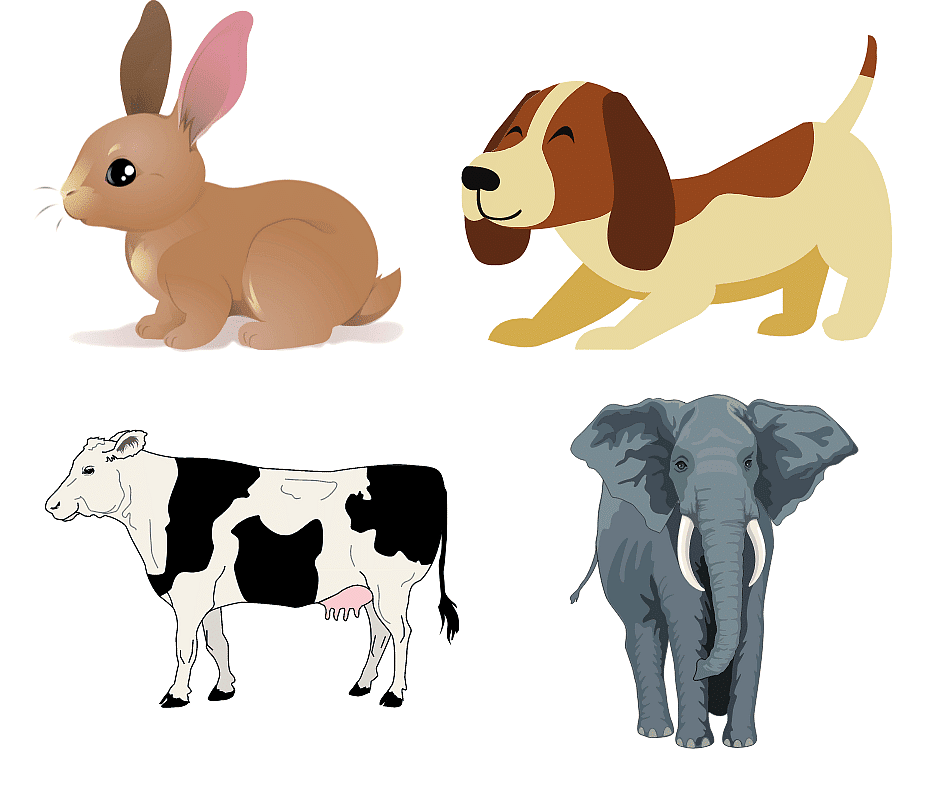
Q2: The names of some animals whose ears are bigger than our ears.
Ans: Elephant, rabbit, cow, buffalo, dog, etc. have ears bigger than our ears.
Think
Q1: Is there some link between the size of animals’ ears and their hearing?
Ans: There is possibly a link between the size of animals’ ears and its hearing. Animals with bigger ears might have better hearing than animals with smaller ears.
Try This
Q1: For this activity find a quiet place in your school. Tell one of your friends to \ stand at a short distance and ask him to say something softly. The rest of you should listen carefully. Then all of you put your hands behind your ears, as shown in the picture. Let the same child say something again as softly as before. In which case was the sound sharper?
 Ans: When I put my hands behind my ears, the sound was sharper.
Ans: When I put my hands behind my ears, the sound was sharper.
Q2: Put your hands over your ears and say something. Can you hear your own voice?
Ans: Yes, I can hear my own voice.
Q3: Sit near a desk. Tap the desk once with your hand. Listen carefully. Now put your ear on the desk as shown in the picture. Tap on the desk once again with your hand. Listen again. Was there any difference in the sound of the tap?
Ans: Yes, when I put my ear on the desk I could hear sharper sound.
Write
Q1: Can you understand the sounds of some animals? Which animals?
Ans: Yes, I can understand the sound of some animals. I can easily tell the sound of dog, cat, cow, horse, etc.
Q2: Do some animals understand your language? Which ones?
Ans: Yes, some pet animals like dog, cat, cow, ox, parrot, etc. understand our language.
Say It With Sounds
Q1: Just like birds and dolphins you can also make your own language of sounds for giving messages. Remember you have to talk to your friends with only sounds and no words. How and when will you need to give an alarm call? For example, when the teacher is coming to the classroom!
Ans: You and your friends can produce some sounds like, Yahoo, Hoho, ping-ping, tik-tik to sound an alarm. This can be used to alert others when the teacher is coming to the classroom.
Sleeping-waking
Q1: Have you noticed that during the cold season you cannot see any lizard in the house? Where do you think they have gone?
Ans: Yes, I have noticed that lizards cannot be seen during the cold season. I think they hide themselves somewhere to escape from the cold and protect themselves.
Q2: How will you show the clock for a house-lizard in winters?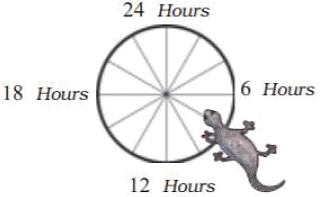 Ans: The white colour in the clock shows sleeping time for lizard in winters.
Ans: The white colour in the clock shows sleeping time for lizard in winters.
Q3: Given here is the sleeping time of some animals. Below each picture write for how many hours a day that animal sleeps. Ans:
Ans:
(i) Cow: 4 hours
(ii) Python: 18 hours
(iii) Giraffe: 2 hours
(iv) Cat: 12 hours
Q4: When you see different animals, do you have any questions about them? Make a list of ten such questions.
Ans: Yes, when I see different animals, many questions come to my mind.
Some of them are as follows:
1. Can they talk with each other?
2. Can they understand our language?
3. Can they see colours?
4. How do they see at night?
5. How do they sense danger?
6. How do they know if something is food for them?
7. How do they feel when a member of their family gets injured?
8. Why only some of them can be made pet animals?
9. How do they save themselves during bad weather?
10. How do they make friends?
Q5: The tiger is one of the most alert animals. And yet, today tigers are in danger. What do you think are some of the dangers to tigers in the jungle?
Ans: Hunters and poachers are the biggest threats for tiger. They kill tigers for skin. Lion is more powerful than tiger and can be a danger for tiger. Large scale destruction of forests is another major danger for tiger.

Q6: Can human beings also be a threat to animals? How?
Ans. Yes, human beings can also be a threat to animals. Human beings kill animals for hide and other body parts. For example; elephants are killed for their tusks, rhinos are killed for their horns. Snakes and crocodiles are also killed for their skin. Increase in human population has led to destruction of forests. This has reduced the natural habitat of animals.
Find Out
Q1: Where are other such National Parks in India?
Ans: Some of the National Parks in India are as follows:
(a) Kanha National Park (Madhya Pradesh)
(b) Kaziranga National Park (Assam)
(c) Gir National Park (Gujarat)
(d) Ranthambhore National Park (Rajasthan)
(e) Nagarahole National Park (Mysore) ,
(f) Palamu National Park (Jharkhand).
Q2: Collect information on these and write a report.
Ans: National Parks have been made to protect animals and plants.
Protecting animals and plants is necessary to protect our environment.
Some animals get Special status in these parks.
Example: Kaziranga National Park gives special protection to Rhinos which are very rare species in the world. Similarly, Gir National Park gives special protection to Lions.
What We Have Learnt
Q1: Have you noticed that sometimes singers put their hand on their ear when they sing? Why do you think they may be doing this?
Ans: Yes, I have noticed singers putting their hand on their ear while singing. They do this to minimize noise. They also do this to hear their own voice more clearly.
Q2: Give examples of animals that may have a very strong sense of sight, hearing or smell.
Ans: Some examples are as follows:
(a) A police dog can smell explosives; which cannot be detected by human beings.
(b) An eagle can see its small prey from high in the sky.
(c) A dog can hear the faintest sound of someone’s footsteps.
(d) A mosquito can find a human being by smelling his body odour.
(e) Some animals behave in strange manner in case of a natural calamity which is about to happen.
|
34 videos|240 docs|41 tests
|
FAQs on NCERT Solutions for Class 5 EVS Chapter 1 - Super Senses
| 1. What are the super senses mentioned in the article? |  |
| 2. How do our senses help us in daily life? |  |
| 3. Can our senses be improved or enhanced? |  |
| 4. What is the importance of having super senses? |  |
| 5. How can we take care of our senses? |  |

|
Explore Courses for Class 5 exam
|

|


















